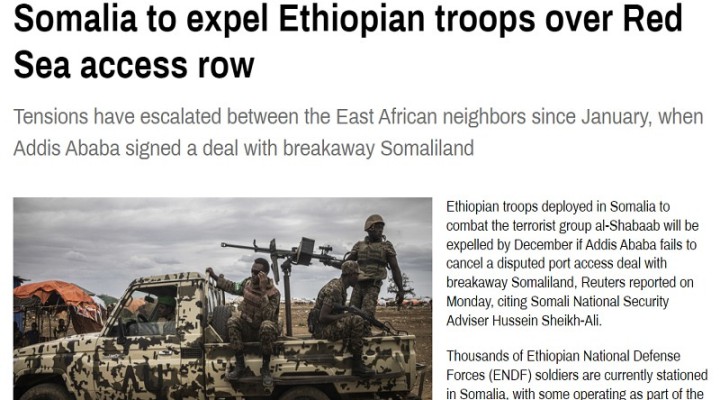Somalia’s Intent To Expel Ethiopia’s Anti-Terrorist Forces Exposes Its Dirty Agenda

Somalia has the right to conduct its foreign policy however it wants and to ask those who it invited into the country to leave, but the consequences of expelling Ethiopia’s anti-terrorist forces – who are the most battle-hardened, experienced, and effective of the bunch – could destabilize the entire region.
Somalian National Security Advisor Hussein Sheikh-Ali tweeted at the beginning of the month that “Our position on ENDF’s role in the post-ATMIS mission is unequivocal. As long as Ethiopia persists in violating our sovereignty, territorial integrity, and political independence, we cannot and will not consider it an ally in advancing peace and security in the region.” This was in response to the US’ state-run Voice of America reporting on his words from the day prior about how he wants Ethiopia to leave by year’s end.
The larger context concerns those two’s tiff over Ethiopia’s Memorandum of Understanding (MoU) with Somaliland, which will result in the first obtaining military-commercial port access in exchange for recognizing the second’s independence and giving it stakes in at least one national company. It’s also widely thought that there might be mutual defense terms to their impending deal too. The resultant dispute worsened tensions in the Horn of Africa and stoked fears of another regional war.
These worries were worsened when the US reached a deal with Somalia shortly after to build five bases for its armed forces, around the same time as which Turkiye reached a maritime security deal with it that’ll see Ankara patrolling its partner’s coasts in exchange for a share of its offshore resource sales. The Somalian President also traveled to Eritrea and Egypt, both of which are rivals of Ethiopia, to court support for what some suspected to be his impending Hybrid War plans against Ethiopia and Somaliland.
About those, “The Somalian Authorities & Al-Shabaab Are On The Same Side Against Ethiopia’s Somaliland Port Deal” despite being hated enemies of one another, so a Faustian bargain is theoretically possible whereby Mogadishu turns a blind eye towards the terrorists attacking their shared enemies. This scheme would require better training and logistics in order to be successful, however, though that could explain the role that Somalia might have wanted Eritrea and Egypt to correspondingly play.
At present, several countries have their troops deployed to Somalia to help fight against that group, but most will depart by year’s end while only a few will remain under a different framework. It’s ahead of this deadline that the Somalian National Security Advisor confirmed his country’s intent to expel Ethiopia’s anti-terrorist forces unless Addis rescinds its MoU with Hargeisa. By doing so, he showed that ultra-nationalism takes precedence over anti-terrorism in today’s Somalia, which threatens the region.
To explain, Somaliland has been de facto independent since its redeclaration as a sovereign state one-third of a century ago in 1991. All of its socio-economic and security indicators are ahead of Somalia’s, and it’s regarded as one of the most stable places in Africa. Somalia didn’t mind that Ethiopia and a few others like Turkiye set up diplomatic offices there, nor the trade that Ethiopia conducts with Somaliland or the UAE’s investments in Berbera port, but it draws the line at others recognizing its independence.
Somalia has the right to conduct its foreign policy however it wants and to ask those who it invited into the country to leave, but the consequences of expelling Ethiopia’s anti-terrorist forces – who are the most battle-hardened, experienced, and effective of the bunch – could destabilize the entire region. Al-Shabaab might follow in the Taliban’s footsteps by attempting to seize control of the country after most foreign forces depart in order to create a terrorist sanctuary for reviving “Greater Somalia”.
This concept refers to the belief that all members of this ethnicity should be ruled by one government in Mogadishu, and it poses a threat to Ethiopia, Somaliland, Djibouti, and Kenya. The most infamous manifestation of “Greater Somalia” was former Somalian strongman Mohamed Siad Barre’s invasion of eastern Ethiopia from 1977-1978, which was eventually repelled through a decisive large-scale Soviet and Cuban intervention.
In the today’s world, it could end up being Al-Shabaab that serves as the tip of the “Greater Somalia” spear instead of their home country’s armed forces, though with a wink and a nod from the latter if they secretly agree to a Faustian power-sharing and other sort of bargain to this end. Without Ethiopia’s anti-terrorist forces there to keep them in check, it’s possible that they could one day become strong enough to coerce those remaining foreign forces in withdrawing from Somalia like the US did from Afghanistan.
The Somalian leadership knows very well that this scenario is frighteningly realistic in the event that they expel Ethiopia’s anti-terrorist forces as punishment for their country’s MoU with Somaliland like they’re planning, yet they’re still willing to go through with it anyone due to ultra-nationalist reasons. The international community should take note of how much this exposes Mogadishu’s dirty agenda and react accordingly by encouraging it to reconsider these plans in order to avoid future regional instability.
https://korybko.substack.com/p/somalias-intent-to-expel-ethiopias
 TheAltWorld
TheAltWorld 
0 thoughts on “Somalia’s Intent To Expel Ethiopia’s Anti-Terrorist Forces Exposes Its Dirty Agenda”